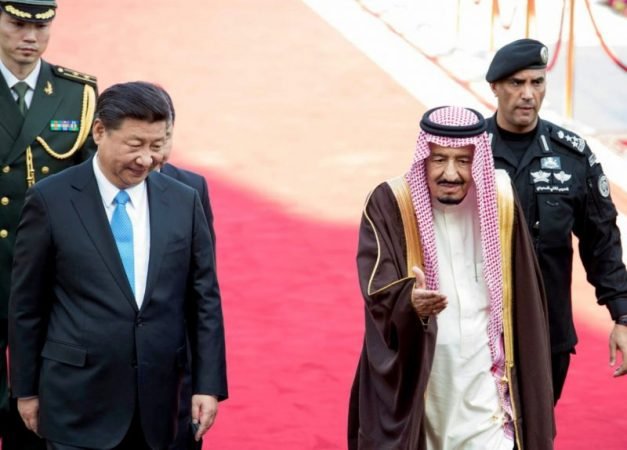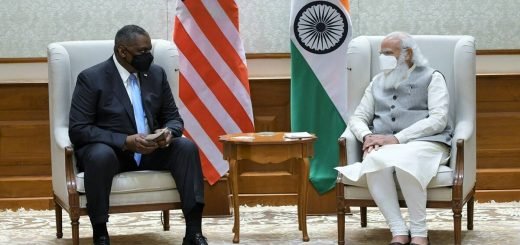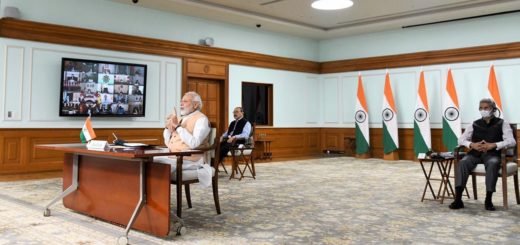GCC and China’s Belt and Road Initiative

China’s Belt and Road Initiative that seeks to recapture the position of China as a centre of major trade and transportation routes has been viewed with awe as well as a concern by other countries. The GCC countries have been an attractive destination for Chinese investment owing to their crucial geographical location and oil resources. China had been keen to make these countries part of the ambitious project spread across 70 countries inhabited by 67% of the world population and contributing towards 40% of the GDP. China has described its cooperation with Arab states as “Industrial park-Port interconnection, Two-wheel and Two wings approach”, signifying the plan to integrate the development of four industrial parks with four ports which together form a horseshoe from the Gulf into the Mediterranean sea through the Arabian Sea and the Red Sea.

Changing dynamics with the US
The GCC has been always considered as belonging to the US sphere of influence, receiving American intervention and military assistance in return for access to their oil. The upcoming shale gas industry in the US, as well as decarbonisation commitments made by the West, has prompted the GCC states to look for other customers, making a fast developing country like China with burgeoning energy demands who also import the largest amount of crude oil every year the best bet. China’s reliance on the region for about 40% of its energy needs makes both parties mutually dependent.
The growing perception in the US, particularly among the public, that the American presence and intervention in the Gulf has not been paying off sufficiently and that disengagement is necessary has made the Gulf states lookout for a new hegemon willing to make military commitments. The fact that the US became a party to the Iran nuclear deal produced a sense of alienation in the Gulf states who had formed the GCC as a bulwark against Iran and Iraq. Though Donald Trump seemed promising when he withdrew from the deal later, his support of troop withdrawal from Syria and Afghanistan corroborates the disillusionment about and fatigue from the continuous engagement in West Asia. The US has not been able to effectively intervene either in the recent Qatar diplomacy crisis within the GCC that has resulted in an unofficial three-way split of the organisation.

Hope for greater Chinese involvement
China shuns western-style alliances and resorts to different tiers of partnership which makes multifarious cooperation possible and is less interventionist. While Saudi Arabia and the United Arab Emirates enjoy a “Comprehensive Strategic Partnership” with China, Chinese relations with Kuwait, Oman and Qatar are placed on a lower level of “Strategic Partnership”. This difference reflects a slight leaning towards the UAE and Saudi, especially in the Qatar crisis and generally in all matters of the region.
The Chinese involvement in the Gulf has been limited to economic so far, attracting the title of a “free rider” exploiting the security offered by the US without making significant contributions in the delivery of public goods. The GCC hopes the strengthening of ties with China would gradually make the latter take up an active role in the defence policy of the region. China’s support for Russia’s proposal of collective security infrastructure in the Persian Gulf involving all stakeholders rather than just the US, the UK or France who are predominantly present now, seems encouraging in this direction. The expectation for a more proactive Chinese role becomes more significant in the light of the Arab Spring protests that threatened the conservative monarchical regimes. As China herself suppresses dissidents and persecutes the Muslim minority Uyghurs who inhabit the Xinjiang province, the GCC states expect China to be okay with their human rights violations. While the West supposedly sees democracy as a precondition for peace, China does not. This is indeed a huge reason for the GCC monarchies to deepen their engagement with China. Similarly, China expects GCC’s support in the South China Sea claim since it had received the backing of another regional organisation Arab League in the same issue.

Prospects and concerns
The GCC states have lately realized the unsustainable nature of their oil-dependent economy and the need to diversify into other sectors. Riyadh’s Vision 2030 is a well-known initiative in this direction, also aiming at transforming the region into a hub of the three continents Asia, Africa and Europe. The investment proposed as part of BRI is not limited to oil alone and seeks to promote renewable energy projects, information technology, infrastructure and transport as well as make use of the strategic importance of the Arabian Peninsula that connects South and Central Asia to West Asia and East Africa. The presence of maritime chokepoints like Strait of Hormuz and Bab al-Mandab Strait, the former being particularly crucial in the shipping route of oil companies, makes the participation of GCC states a strategic gain for China. Amid the tensions with the US, Iran had threatened to close the Strait of Hormuz through which oil worth more than 1 billion US dollars passed daily. The strait’s security is a matter of grave importance to the GCC since the closing of it would render oil export impossible. Investment in the oil sectors would make it a priority for China as well.
Primarily based on social justice, the Islamic finance system prohibits the charging of interest and promotes the sharing of profits and losses among the lender and the borrower. Islamic finance institutions were expected to partially fund the BRI projects in the region and thus receive a much-needed fillip at the international level.
Iran’s key position in the Belt and Road Initiative and its close relations with China had been a cause of concern for the GCC. But China has been, of late, reducing its dependence on Iranian oil and importing more from Saudi Arabia. Though China and the US have been in a trade war and are competing with each other for hegemony, their trade relations are too significant and cause huge losses to both parties if cut off. For the same reason, China would not risk its trade with the US in order to protect or defend Iran.
The increased competition the ports and economic zones in the GCC states would have to face with the development of similar or better infrastructure in other countries as part of Belt and Road Initiative is a concern that is hard to justify. The competitors like Gwadar Port in Pakistan should ideally drive the GCC states to innovate better, setting aside the complacency arising from huge oil revenues.
The reports of China saddling countries like the Maldives and Sri Lanka with debts that would take decades to pay off had raised alarms on the lack of transparency surrounding the terms of lending, investment and awarding of contracts. It was alleged that these projects employed Chinese firms overwhelmingly instead of availing the most affordable or the best services. Though the abundant wealth reserves with the GCC make the possibility of getting into a debt trap pretty remote, every country that becomes a part of BRI deserves more transparency, if China really views them as equal partners.

Impact of COVID-19
The economic diversification that is supposed to follow BRI becomes more relevant in light of the COVID crisis which exposed the unsustainable nature of the GCC economic model that relies on oil revenues for diversification efforts as well as maintenance of the welfare system offered to the citizens in return for the consent to be governed, especially under a repressive system that violates human rights and personal liberties.
The usual concerns about BRI aside, the ability of China to go ahead with the project has been called into question as the Chinese economy has been impacted quite badly by the COVID outbreak, causing many manufacturers to shift their bases elsewhere and affecting the Chinese dominance of supply chains. Chinese nonperforming assets had been ballooning due to indiscriminate lending and a number of BRI projects had been shelved, cancelled or delayed due to reluctance of China as well as that of the partner countries. Perhaps even more debts and bad loans cannot be avoided on the road to recovery and China would not be able to finance a project of this scale and the other countries would not be able to afford huge loans anytime soon. Once the world partially recovers from the financial crisis brought about by COVID, economies would want to attract international investments and BRI would hopefully see a revival.


















